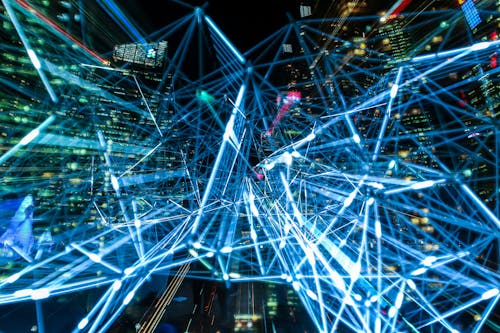A Glimpse into the AI Revolution
Artificial intelligence (AI) is no longer a futuristic concept; it has already begun reshaping industries, societies, and everyday lives. From voice assistants to predictive analytics, AI has made an undeniable impact across numerous sectors. As we look to the future, the question on many minds is: What will AI look like in 10 years?
Over the next decade, AI is expected to evolve at an even faster pace, with advances in technology and understanding pushing the boundaries of what’s possible. While there’s still much to learn, AI’s potential is vast and will likely transform the way we work, live, and interact with the world.

The Evolution of AI Technology
Artificial intelligence has made significant strides in recent years, particularly in areas such as machine learning, natural language processing, and computer vision. In the next 10 years, we can expect these technologies to mature and become more sophisticated.
1. Autonomous Systems and Robotics
Autonomous systems, particularly in robotics, are likely to see significant improvements. From self-driving cars to drones, AI-powered machines will become more intelligent, reliable, and capable of performing complex tasks. The next decade could see the widespread adoption of autonomous vehicles, drastically changing transportation and logistics. Self-driving cars, trucks, and even ships may no longer be a novelty but a common aspect of daily life.
In robotics, AI will enable machines to work alongside humans in a variety of industries, from healthcare to manufacturing. Robots will be more intuitive, capable of performing delicate surgeries or assisting in complex industrial processes with greater precision and efficiency.
2. Personalized AI in Everyday Life
In 10 years, AI will likely be even more integrated into our daily lives, offering a deeper level of personalization. Virtual assistants such as Siri, Alexa, and Google Assistant may evolve into highly intelligent companions that not only understand commands but also anticipate needs and preferences. Imagine an AI that learns your routine and suggests healthier habits, anticipates the best times for meetings, or recommends personalized entertainment and activities.
Personalized AI could also extend to education, where learning experiences are tailored to individual needs. AI-driven platforms will adapt to a student’s learning style, helping them achieve their full potential. In healthcare, AI will be increasingly able to offer personalized treatment plans by analyzing a patient’s unique medical history, lifestyle, and genetic data.
3. The Integration of AI in Creative Fields
One of the most exciting aspects of AI’s future is its integration into creative industries. In the next decade, AI could play a major role in art, music, writing, and entertainment. While AI-generated works are already making waves, they will likely become more advanced, with AI systems collaborating with human creators to produce original, high-quality content.
AI’s ability to analyze patterns, recognize trends, and generate ideas could inspire new artistic expressions and push the boundaries of creativity. Musicians could collaborate with AI to produce entirely new sounds, while writers might use AI tools to brainstorm or assist in generating storylines. Even in visual arts, AI could help artists experiment with new styles, blending human creativity with machine intelligence.
4. AI and Healthcare Advancements
In the next 10 years, AI will likely revolutionize healthcare, making it more efficient, accessible, and personalized. AI will become an essential tool for diagnosing and treating diseases, particularly as its ability to analyze large sets of medical data grows. Machine learning algorithms will be capable of identifying patterns in patient data that even the most experienced doctors might miss.
AI-driven diagnostic tools will become more accurate, allowing for earlier detection of conditions such as cancer, heart disease, and neurological disorders. Additionally, AI will likely help in the development of personalized medicine, where treatment plans are tailored to individual patients based on their unique genetic makeup and medical history.
Robotic surgery will also become more precise, with AI assisting surgeons in performing complex procedures. This will improve patient outcomes and reduce the risk of human error. Furthermore, AI could facilitate the development of new treatments and drugs by analyzing vast amounts of data from clinical trials and research studies.
5. Ethical Considerations and Regulation of AI
As AI becomes more integrated into society, ethical considerations will be at the forefront. With the growing capabilities of AI systems, there will be concerns about privacy, bias, and the potential for misuse. In the coming decade, there will likely be an increased emphasis on developing ethical guidelines and regulations surrounding the use of AI.
One of the main concerns is data privacy. As AI systems collect and process vast amounts of personal data, it’s essential to ensure that individuals’ privacy is protected. Additionally, the algorithms behind AI systems can sometimes reflect biases present in the data they are trained on, leading to unfair or discriminatory outcomes. Over the next decade, advancements in explainable AI and transparency will be crucial in addressing these concerns.
Governments and international organizations will need to collaborate to create comprehensive regulations that ensure AI is developed and used responsibly. This will include setting standards for data protection, ensuring AI systems are transparent and explainable, and preventing harmful or unethical applications of AI.
6. The Future of AI in Work and Employment
AI’s impact on the workforce will continue to evolve over the next 10 years. While AI has already started automating many tasks in industries such as manufacturing and customer service, the next decade will likely see broader applications in areas like healthcare, legal services, and even creative professions.
AI will continue to assist workers by automating repetitive tasks, allowing humans to focus on higher-level responsibilities. However, there will also be significant challenges, such as the displacement of certain jobs. To address these concerns, there will likely be a greater emphasis on reskilling and upskilling workers to adapt to the new AI-driven economy. The ability to work alongside AI tools will become a critical skill for future workers.
At the same time, AI will open up new job opportunities in fields such as AI research, machine learning engineering, and data science. As AI systems become more sophisticated, there will be an increasing demand for professionals who can build, maintain, and improve these systems.
7. The Rise of Artificial General Intelligence (AGI)
One of the most talked-about possibilities for the future of AI is the development of artificial general intelligence (AGI)—AI systems that possess human-like cognitive abilities and can perform a wide range of tasks without being specifically programmed for each one. While AGI is still a distant goal, advancements in machine learning and neural networks could bring us closer to creating systems that exhibit more general intelligence.
In the next 10 years, research into AGI will likely continue at an accelerated pace, with the goal of developing machines that can learn and adapt to new tasks in ways that are similar to how humans do. However, the development of AGI raises significant concerns, such as ensuring that such systems are aligned with human values and goals.

8. AI and Environmental Sustainability
As the world grapples with the challenges of climate change and environmental degradation, AI will play a crucial role in finding solutions. AI can help optimize energy consumption, improve waste management, and support the development of sustainable technologies. In agriculture, AI will help increase crop yields and reduce resource waste by optimizing irrigation and farming practices.
AI will also assist in monitoring and addressing environmental issues such as pollution, deforestation, and biodiversity loss. By analyzing vast amounts of environmental data, AI systems will help identify patterns and recommend solutions to mitigate environmental damage.
The Road Ahead
The next 10 years will undoubtedly see AI evolve in ways we cannot fully predict. From autonomous machines to personalized healthcare, AI’s potential is limitless, and its influence will continue to grow. However, as AI becomes more powerful, it will be essential to ensure that it is developed responsibly and used for the benefit of all. The future of AI holds great promise, but it also requires careful consideration of its ethical, societal, and economic impacts.
As we look to the future, one thing is certain: AI will continue to shape the world in profound ways, transforming industries, improving lives, and pushing the boundaries of human innovation.





